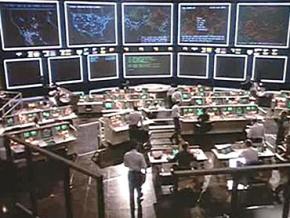“Do you want to play again?”
reviews War Games, now 25 years old with an all-too-relevant take on the arms race.
WHEN THE Cold War political thriller War Games was released 25 years ago, it cut against much of what was being sold by Hollywood by portraying realistic, vulnerable teenagers who weren't drunken, horny party animals and by challenging the backward thinking of the nuclear powers.
The film is about two teenagers, played by Matthew Broderick and Ally Sheedy, who hack into an online military simulator and challenge it to a game of nuclear war. It turns out this computer is actually the War Operations Planned Response (WOPR) artificial intelligence system working for the U.S. military. The Air Force radar system it is connected to confuses this "game" for a real attack, setting off a chain reaction of events that nobody seems able to control.
On paper, Broderick and Sheedy's quest to save the world from itself by convincing the U.S. military to stand down reads like a preposterous fairytale. But War Games manages to pull it off with a suspenseful plot and smart characters.
One thing that makes War Games so effective is that the writers understood--as seemingly dozens of CSI knock-offs do not--that suspense and mystery work better when the viewer gets into the mind of the guilty and the pursued. So rather than Broderick being some all-American Boy Scout, he is a young hacker who likes to get himself into trouble.
When he finally gets into the game system, Broderick is not interested in playing checkers or chess. Instead, he really wants to play Global Thermonuclear War--who wouldn't?--and when the computer asks him which side he wants to be on, he responds sheepishly, "I'll be the Russians!"
What follows not only provides great suspense but also cuts sharply against the main assumption behind U.S. strategy in the Cold War--that we are safer by being permanently prepared to launch a devastating counterattack against the USSR.
Alongside the threat of nuclear war is the theme of computers and technology having too much power. At the beginning of the movie, we see two missile commanders in a silo ordered to launch a nuclear attack. They don't realize it is just a test and one of them refuses to carry out his orders.
We then see U.S. Air Force leaders discuss what a problem it is that 22 percent of missile commanders refuse to launch when ordered. This is certainly a problem for the military--although not necessarily for anybody else--and leads to the decision to empower the WOPR to control missile launches.

The lesson is not just about the threat of the growing power of technology, but that the nuclear powers should not act like computers. They should have a heart as well as a mind and see what madness the arms race has wrought.
There is a sense in which this message is directed more at the powers that be than the audience. This leads to some hokiness in how Broderick and Sheedy find the cynical professor who designed the WOPR and they all end up in the position to argue with U.S. military to stop the impending disaster.
But War Games had many opportunities to fall totally flat on its face. The script started as The Genius, a story of a teenage misfit and his relationship with a Stephen Hawking-like physicist. Eventually, the teenager turned into a hacker and the physicist turned into the designer of the WOPR.
Somehow, The Genius turned into a sharp political thriller with the nuclear establishment directly in its crosshairs. It should come as little surprise, though, that War Games does not portray the U.S. military as utterly worthless and irredeemable--as they are portrayed in the 1960s nuclear farce Dr. Strangelove. Certainly, Strangelove is the direct ancestor of War Games and it provides a political critique that is much more pointed and uncompromising, as with the general who thinks acceptable casualties are "10 to 20 million, tops!"
The leading general in War Games, on the other hand, is much more open to a reasonable argument. But we do get to see some of the foolishness at the top with ego battles between military and civilian leaders arguing over whose plan for nuclear holocaust should be accepted by the president and knee-jerk assumptions by military officials that Broderick is working for the KGB, straight out of some right-wing Cold War fantasy.
Ultimately, War Games is a gripping thriller that is great fun to watch with a clear political message--in the game of nuclear war, the only winning move is not to play at all. So how about a nice game of chess instead?


